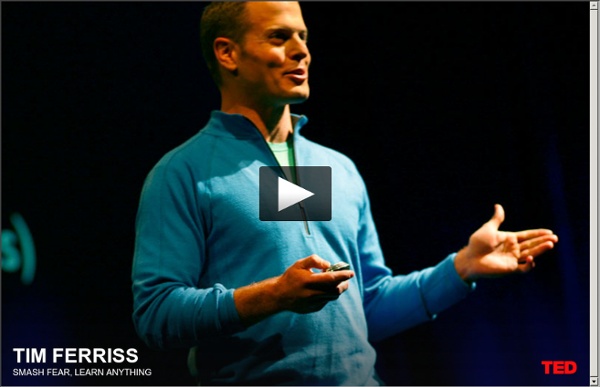



http://www.ted.com/talks/tim_ferriss_smash_fear_learn_anything.html
Related: self - developmentWhy 'Fake It Till You Make It' Is So Effective, According to Science It took me a while before I started calling myself an author. I've been writing this column for almost two years, and have reached an audience well into the millions. I'm about to finish my first book (which I've ghost written for a New York Times best-selling author), and I'll be publishing my own book--with high hopes--in just a few months. (If you'd like to follow the launch, sign up here for free updates.) The Art of Influence Secrets to complaining effectively, motivating loved ones, and getting what you want without being a jerk. Illustrations by Lou Brooks Babies and psychopaths have one thing in common: They're excellent at getting what they want.
How to Change Your Brain With rendition switcher Question: What is neuroplasticity? Sam Wang: Well, people have known that experience can change the brain ever since it became known that the brain was the seat of consciousness, thought, and experience. And so, I would say that for hundreds of years, it’s been known implicitly that the brain must undergo change because, of course, if the brain is the physical object by which we generate our consciousness and ourselves, then there must be some physical change happening in the brain.
This Is How To Make Good Habits Stick: 6 Secrets From Research We all want to get to the gym, be more productive, be kinder to our loved ones… and then we don’t do it. Why? Well, building solid personal habits can be hard. Thinking like a genius: overview Thinking and recall series Problem solving: creative solutions "Even if you're not a genius, you can use the same strategies as Aristotle and Einstein to harness the power of your creative mind and better manage your future." The following strategies encourage you to think productively, rather than reproductively, in order to arrive at solutions to problems. "These strategies are common to the thinking styles of creative geniuses in science, art, and industry throughout history."
Learn How to Think Different(ly) - Jeff Dyer and Hal Gregersen by Jeff Dyer and Hal Gregersen | 10:24 AM September 27, 2011 In the Economist review of our book, The Innovator’s DNA, the reviewer wondered whether genius-level innovators such as Marc Benioff, Jeff Bezos, and Steve Jobs challenge the idea that working adults can really learn how to think differently and become innovators. We don’t think so. Remember, it was Steve Jobs who jump-started the now-famous “Think Different” advertising campaign as a way to inspire consumers and recharge Apple’s innovation efforts. It worked.
How to get massively motivated in less than 60 seconds - Commit Action Confession time: Even highly driven and productive entrepreneurs still struggle every day to turn on their motivation when they need it. Perhaps you’re one of these folks. You’re busy. You’re building a kickass business. You get a a lot done. BUT – and it’s a big “but” – you still fight a daily struggle to focus on the important things you need to get done. Improve Your Writing by Avoiding These Twenty Common Grammar Mistakes Almost Everyone Makes Thanks for that! The moot thing seemed wrong and I was going to look it up. Jon Gingerich isn't entirely wrong about "moot." The first definition in the OED, with examples going back to 1563, is: 1. Originally in Law, of a case, issue, etc.: proposed for discussion at a moot (moot n.1 4).